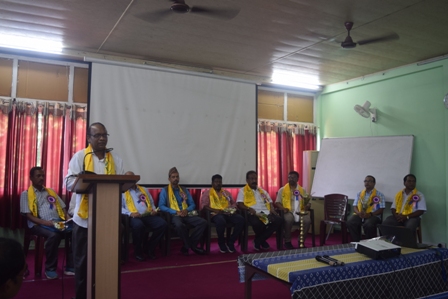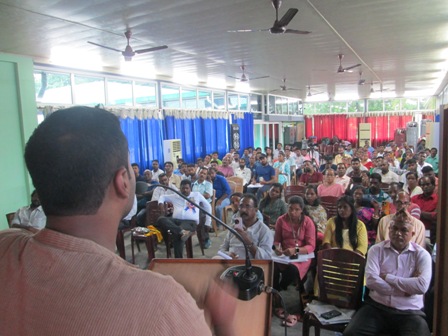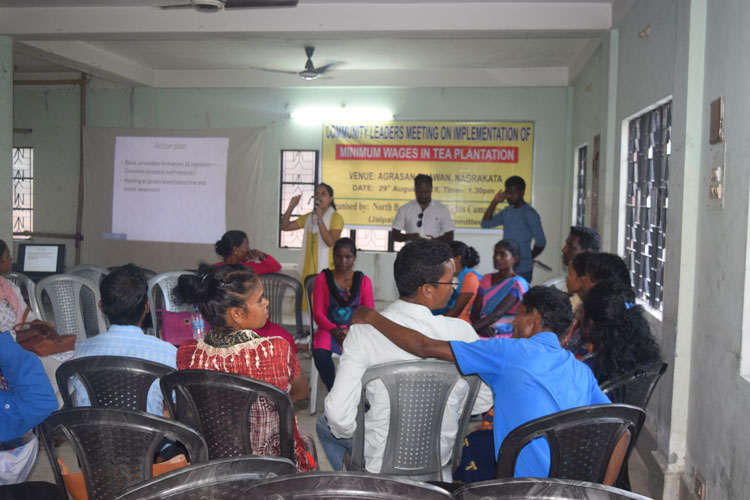




Since the inception of Lok Manch (2016), under Human Life Development and Research Centre (HLDRC), community leaders have been the main players in the project. These leaders are considered the soul of the project. Keeping these aspects in mind, the project has always aimed to strengthen the knowledge, skills, and perspectives, especially on core values of the Indian constitution. At the same we observed growth in:
(1) Awareness of various social security programs.
(2) Being vigilant to the implementation of social security programs.
(3) The realization that one can rightfully claim full benefits under a scheme has improved availing of social security benefits by eligible households.
Later these capacitated leaders evolve themselves in campaigns with hand-holding support of Alliance partner and Network organizations. In respect to Campaign initiative, Lok Manch under HLDRC is engaged three major campaigns in Collaboration with the project alliance partner, network partner and other likeminded organizations and of course some prominent leaders within the community, keeping in mind the priority need of the community in the tea gardens on North Bengal region.
1. Minimum Wages in the Tea Garden
We are very glad to share that HLDRC in Collaboration with Lok Manch Alliance Partner Seva Kendra Siliguri (SKS) Jalpaiguri Seva Sadan( JSS)and Gramin Vikash Kendra GVK) and Network organization, some prominent and active leaders from tea garden along with likeminded organization, have succeeded to increase the agreed negotiable Wages of Tea Garden in the Region of North Bengal, by conducting Rally, awareness Program and Submitting Memorandum up to the ministry Level.
In the year 2016 the agreed negotiable Wages in the Tea Garden of North Bengal was Rs.132.50 per day and than in the year 2018 the agreed negotiable wages was raised up to Rs. 176.00 per day.Again, by the end of 2020 the agreed negotiable Wages of Tea Garden Labor was raised up to Rs. 232.00 per day, which was announced by the Government of West Bengal in the Year 2020 and it go implemented from the 2021. This has proved to be a tremendous support for the tea garden worker to improve their daily life and support their family. At the present time all alliance and network organizations are in a continuous process in continuing campaign on Minimum wages for the tea garden workers as a part of economic support to the workers families.
2. Land Rights for the Tea Garden Resident
Human Life Development (HLDRC), since its establishment in collaboration with alliance partners and Networking partners, social activists and active leaders from tea garden have taken initiatives to engage in the Campaign of Land Rights for the Community of tea workers in the North Bengal region of West Bengal India.
After eight year of long struggle in West Bengal Government has passed “West Bengal Land Reform Amendment Bill 2023” In this bill the government has announced the conversion of lease land to free hold land to lessee. Not only free hold land but also the lessee can be owner as a Raiyat. As every tea garden is having labour line which is also situated in these lease land, but no specific land settlement is mentioned in the bill for the Adivas iand other tea worker community and their inheritance living in this area before Independence.
HLDRC in collaboration with alliance and network organizations is playing a vital role in demanding the withdrawal of the bill through creating awareness among the tea garden community in north Bengal region. To have better understanding of land, HLDRC is also collaboratively working with Advocate Mr. Navin Prakash Kerketta giving us a session on various land laws/Acts and peoples’ rights.
West Bengal land laws after Independence 1947
• West Bengal Estate Acquisition Act 1953
• West Bengal land and Land Reforms Act 1955
• The West Bengal Acquisition and Settlement of Homestead Land Act 1969
• The West Bengal Acquisition of Homestead Land for Agricultural Labourers, Artisans and Fisherman Act, 1975
• NIJO GRIHA NIJO BHUMI (NGNB) 2011
• Forest Dweller Act 2006
• Chai Sundari Yojna 2019-2020
Bill No. 4 of “The West Bengal Land Reforms (Amendment) Bill, 2023”
Difference between Lease Land & Freehold Land
Process of claiming individual Land in Possession through BL & LRO office and District Magistrate. HLDRC has been playing a very vital and Proactive involvement in awaking the masses and stake holder of tea garden community in the three district of North Bengal region namely Darjeeling Jalpaiguri and Alipurduar District through Publication on land Rights, laws and Acts.
3. Maternity Benefit for the women in Tea Garden
Human Life development and Research centre (HLDRC) in Collaboration with Lok Manch (ESP) and other four direct alliance partner organization along with the Network partner and likeminded organization is also engaged in Campaign mode on Maternity Benefit for the women of the tea garden in the North Bengal Region since 2017. Since then we are in a continuous process of giving them awareness on Maternity Benefit as per the Central government Maternity Benefit Act 1961 and state government schemes under National Food Security Act 2013. We are also in a continuous process to motivate the community of tea garden as how they are eligible to avail Maternity Benefit if they are engaged in an organized or unorganized sector.
Since the beginning of Establishment 2013 Human Life development and Research centre (HLDRC), a Jesuit social Centre under Darjeeling Province has played a very vital role in more than 200 Tea Garden of North Bengal Region to strengthen the tea garden community and empower the marginalized community in tea garden area to bring them in the mainstream of society and help them to live a better standard and respectable life.
Now in today’s context community leaders need to sustain their movement. For these, we need a platform and formalizing organizational structure and capacity building so we would able to form a federation or Community convergence facilitation forum (CCFF). Active leaders will lead these formal bodies with other community members to raise their voices for their own rights and local developmental issues. We make sure these CCFFs will be strengthened through capacity on organizational structure and dynamics in due time of course.